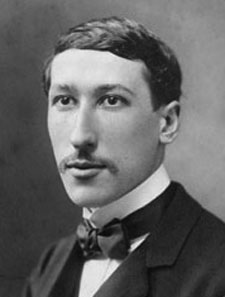Remembering René Guénon:
November 15, 1886–January 7, 1951
Greg Johnson
René Guénon was born on November 15, 1886. Along with Julius Evola, Guénon was one of the leading figures in the Traditionalist school, which has deeply influenced my own outlook and the metapolitical mission and editorial agenda of Counter-Currents Publishing and North American New Right. (For a sense of my differences with Guénon, see my lecture on “Vico and the New Right.”)
In commemoration of his birth, I wish to draw your attention to the following works on this website.
- Alain de Benoist, “Spiritual Authority and Temporal Power,” trans. Jon Graham
- Julius Evola, “René Guénon: East and West,” trans. anonymous, rev. Greg Johnson
- Greg Johnson, “Metapolitics and Occult Warfare,” Part 1, Part 2, Part 3, Part 4 (French translation here)
- Edouard Rix, “Remembering René Guénon,” trans. Greg Johnson
- Harry Oldmeadow, “Biography of René Guénon“
- Thomas F. Bertonneau, “The Kali Yuga: René Guénon’s Critique of Modernity“
This relative handful of articles does not give a true sense of Guénon’s importance, for along with Evola, Nietzsche, and Spengler, he is also one of the most widely mentioned thinkers on this site. It is a presence, and an influence, that will only grow in time.
Those looking for an introduction to Guénon’s work should begin with the short and relatively accessible The Crisis of the Modern World. For a judicious overview of Guénon’s works, see The Essential René Guénon: Metaphysics, Tradition, and the Crisis of Modernity. My personal favorite among Guénon’s books, and the one the provides the most “empirical” access to the idea of Tradition, is Symbols of Sacred Science.
For a brief biography of Guénon, see Robin Waterfield, René Guénon and the Future of the West: The Life and Writings of a 20th-Century Metaphysician and Paul Chacornac’s The Simple Life of René Guénon. For an interesting and readable historical/journalistic account of Traditionalism, see Mark Sedgwick, Against the Modern World: Traditionalism and the Secret Intellectual History of the Twentieth Century.
Remembering%20Ren%C3%A9%20Gu%C3%A9non%3A%20November%2015%2C%201886%E2%80%93January%207%2C%201951
Enjoyed this article?
Be the first to leave a tip in the jar!
Related
-
Nowej Prawicy przeciw Starej Prawicy Rozdział 2: Hegemonia
-
Nowej Prawicy przeciw Starej Prawicy, Rozdział 1: Nowa Prawica przeciw Starej Prawicy
-
Nowej Prawicy przeciw Starej Prawicy: Wprowadzenie
-
Nowej Prawicy przeciw Starej Prawicy: Przedmowa
-
Notes on Plato’s Alcibiades I Part 2
-
Earth Day Special
-
Notes on Plato’s Alcibiades I Part 1
-
Counter-Currents Radio Podcast No. 582: When Did You First Notice the Problems of Multiculturalism?

5 comments
‘Symbols of Sacred Science’ was the first book of Guenon’s that I read and it had a profound effect on my thinking. Guenon is a metaphysical hard-ass and ‘Symbols of Sacred Science’ is the equivalent of Euclid’s ‘Elements’, deducing the meaning of symbols based upon first principles. In my experience, it’s a unique work.
It’s interesting that you should liken René Guénon’s work to Euclid’s Elements; while I’m unfamiliar with Guénon’s work, I’ve read that his thinking has been characterized as “geometric,” and it’s conceivable that Euclid may have been an influence in this context. Indeed, I recently learned of a book — David Hirsch and Dan Van Haften’s Abraham Lincoln and the Structure of Reason — which argues that Abraham Lincoln was strongly influenced by Euclid’s Elements, using its geometric method to structure his rhetoric and writing. (From memory, I believe that Lincoln’s rhetoric is discussed in Richard M. Weaver’s The Ethics of Rhetoric, a book I might reexamine soon.)
I’m more interested in abductive logic, as used by Adolf Hitler and examined in Ben Novak’s captivating book, Hitler and Abductive Logic. Perhaps Hitler’s use of abductive logic helps to explain why he was, as Salvador Dalí put, “a man uniquely capable of turning things completely upside down” — or, as I’d prefer to put it, putting them right-side up.
I believe there’s a strongly critical appraisal of Guénon in Philippe Baillet’s book, L’Autre Tiers-mondisme. Baillet is a noted French translator of Julius Evola and an interesting author in his own right.
I wish to thank Greg for the “Remembering” series.
Guénon is, in my estimation, one of our greatest thinkers.
From his “The Crisis of the Modern World” to his deep search for spiritual reality I am in awe of the man. We can learn from him and the others in this series.
Greg KEEP UP THE GOOD WORK!
Crowley is a far more important figure than Guenon— both in his political and occult works.
Of course, perhaps Guenon’s dislike of the Golden Dawn is causing me to not view him from an objective basis
Has anyone written about his physiognomy? If not, it’s the elephant in the room. That face is too big for the head. It looks like a mask. And it’s not just that photo, I’ve seen other ones. To put it bluntly, he looks like a freak. If he was alive I wouldn’t write this.
Comments are closed.
If you have Paywall access,
simply login first to see your comment auto-approved.
Note on comments privacy & moderation
Your email is never published nor shared.
Comments are moderated. If you don't see your comment, please be patient. If approved, it will appear here soon. Do not post your comment a second time.